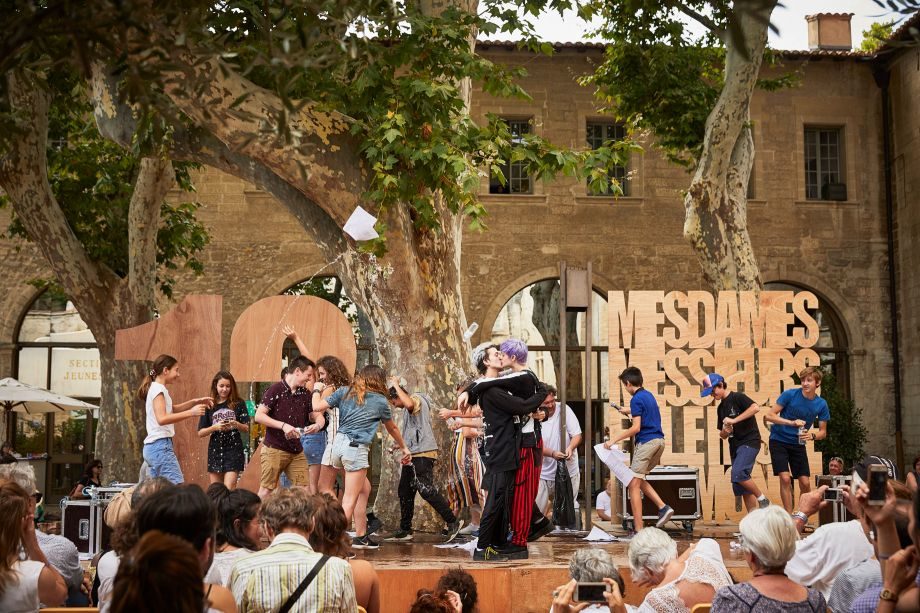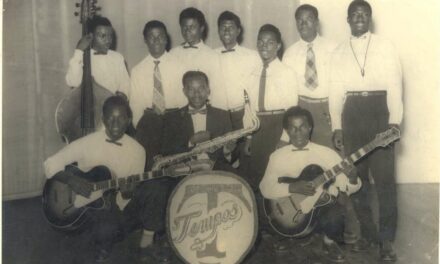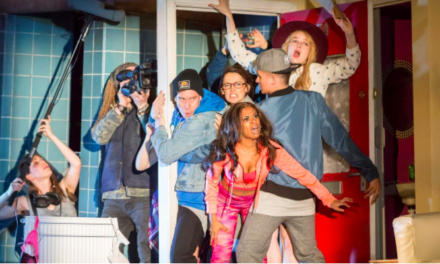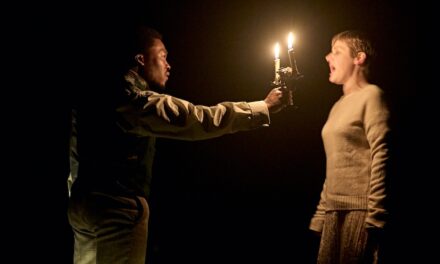In an article from 2014 and published by TheTheatreTimes.com, American playwright, translator, and journalist Amelia Parenteau reflected on the place of women in French theatre, and their under-representation. Almost four years later, where are the women in French theatre today? Spoiler alert: nowhere near where they should be.
For this year’s Festival d’Avignon, director and scenographer David Bobée chose the Ceccano Garden in Avignon to create an open stage. He invited artists and amateurs to discuss the gender inequalities that kindle the public debate today. By selecting different materials and forms–performance, workshops, public interventions, readings–Bobée’s guests could poetically and artistically analyze and criticize the norms and discourses of our modern world. Through thirteen episodes, Bobée’s “theatrical series,” called Mesdames, Monsieurs Et Le Reste Du Monde (Ladies, Gentlemen, And The Rest Of The World) explored gender assumptions, invisibilization, and inequalities, actively inviting spectators to reflect on those issues as well.
On July 13th, during the sixth episode, The First Non-Racist And Non-Gendered Molière Ceremony, Carole Thibaut, artist and director of the Théâtre des Îlets, Centre National Dramatique de Montluçon, gave an enlightening ten-minute allocution on the place of women in French theatre. In what would be an acceptance speech of a fake Molière prize (the most important theatrical award in France), Thibault revealed and exposed, with numbers and hard evidence, how French women artists–specifically authors, playwrights, and directors–constantly get fucked in the exercise of their profession. The whole monologue has been posted on Youtube and has been shared by artists and the general public–including left-wing political associations–ever since. I would like to reproduce some excerpts of her speech, in my translation, for the American and English-speaking readers.

Carole Thibault during her speech in Avignon
“I would like to thank you for this Molière. Probably the only Molière I’ll ever win. It’s not a question of talent. We’re not talking about talent, here.
I’m sorry. I started writing a funny thing. One of those things people ask me to do, every once in a while. ‘Hey, how about we invite Thibault? She’s funny, Thibault. She’s feisty but funny. She enjoys breaking our balls a little bit with her whole gender equality thing, but she’s funny. She throws funny hissy fits […]’. And quickly you become a clown, the King’s Fool. And the King here, as everywhere else, is male domination […] And I, I’m tired of being the buffoon of male domination.
Two years ago, at this same place, Thomas [Jolly, theatre director] invited me to write and then read a piece on the absence of women authors in the Festival d’Avignon since its beginning. Specifically, on the Cour. The big theatre Cour. La Cour D’Honneur [of le Palais des Papes, the most important venue of the Festival].
La Cour D’Honneur is like the Molières. When you are a woman artist, one of those women who have the ambition of being on that side of the creative work–I mean author, playwright, director, scenographer- when you’re one of those good women who have that ambition, you know all that is not meant for you. Get that stuck in your tiny brain, you little women artist: La Cour D’Honneur and the Molières ARE NOT MEANT FOR YOU. Or, if you want, you could try children’s theatre. Here, children’s theatre is a perfect place for good old women artists.
So, two years ago, I was here, in this same spot, bitching about the almost total absence of women authors in the Avignon IN stage, invited by Thomas. This year, two years later, Thomas is programmed at la Cour D’Honneur, and I’m still here, this time invited by David, bitching once again, with a funny and spirited speech, about the situation of women authors and artists. Two years ago, I had high hopes this situation would change, since we were talking, right here, about the scandalous lack of representation of women at the IN festival […]. This year’s IN programme, excluding children’s theatre, includes 9% of women authors, against 91% of male authors. (For children’s theatre, women authors represent 75% of the total programme). This year, two years later, for the “theatre” category in the IN programme, there is 89,4% of male directors, against 10,6% of women directors […].
I’ve had it up to here with this majority of speechless women, deprived of their right to speak up, coming here and sitting down, in the darkness of an auditorium, to obediently receive the men’s Word, the men’s worldviews, who, to make matters worse, are all white. […] Women got fucked during the French Revolution. They got fucked during the Paris Commune. They got fucked during the Popular Front’s government. They got fucked for May 68. And they still get fucked in Avignon 2018, this Grand Festival, and which this year’s theme is… gender! […].
And this is how we’ve gotten fucked, for centuries, decades, years, months. It’s not something exclusively societal or political. It’s engraved in our flesh, in the darkest nooks of our brains, in our unconscious, our subconscious. This corrupts our lives. These are not just numbers and statistics. And yet we need to measure all this, analyze it, to really look at our humiliation in the face, to look at this system that excludes us, in front of everybody, without any retaliation […].
Because we can keep revindicating the freedom of being male, female or both. The truth is when you’re born with a woman’s sex, or when you become a women […] you’re part of a caste of people who get fucked, screwed, reduced to nothing, their whole lives. […] Whether you receive a vagina or a dick when you’re born, you’ll be predetermined as a dominant or a dominated person. Because the phallocentric culture and the patriarchy are the little kings that keep reigning in this country, and specifically, this little, cultivated domain, so proud of its open-mindedness, so proud of its so-called creative freedom, of its freedom of speech, of choice, so proud of its prerogatives, so preachy in front of the whole world. Phallocentric culture and male domination are the disgraces of the intellectual, artistic and cultural milieux of this country. […]
I don’t want your award, David. It’s like being hit with a cobblestone right in my face. And beyond numbers and hard evidence, we will not believe in anything anymore. To avoid putting up with the shame of crying once again.”
Thibault’s speech is not only a bitchy speech on gender equality or sexism against women artists. It is a cry for help in a country that supposedly fights for equality and freedom, but that actually does very little to eliminate the gender gap in the arts, sciences, politics, or even language. Advertising for a more inclusive language–as the Secretary of Equality between the women and the men, Marlène Schiappa, has painfully understood–seems as revolutionary as cutting the king’s head with a guillotine. Given the current situation, what can we expect in the performing arts and gender equality in France? According to a rapport published in 2018 by the French Ministry of Culture, entitled Observatoire De L’égalité Entre Femmes Et Hommes Dans La Culture Et La Communication, the situation is dire. Only 34% of plays for the 2017-2018 season have been directed by women. This number considers every type of venue (national theatres in all regions, as well as circus and dance), so percentages may vary for each category. Unsurprisingly, the highest rate of participation of women directors occurs in dance centers.
Even though, as Amelia Parenteau noted in her 2014 article, the French Ministry of culture has tried to impose gender quota in performing arts to change the situation of women in that domain, all these efforts, as Carole Thibault has so bluntly pointed out, still seem ineffective. As long as women haven’t earned their rightful place on the French stage–as men’s equals, in every respect–there will be Carole Thibaults standing in lonely, secondary stages, bitching about how women in French theatre (and everywhere) get fucked.
This post was written by the author in their personal capacity.The opinions expressed in this article are the author’s own and do not reflect the view of The Theatre Times, their staff or collaborators.
This post was written by Andrea Pelegri Kristić.
The views expressed here belong to the author and do not necessarily reflect our views and opinions.

















